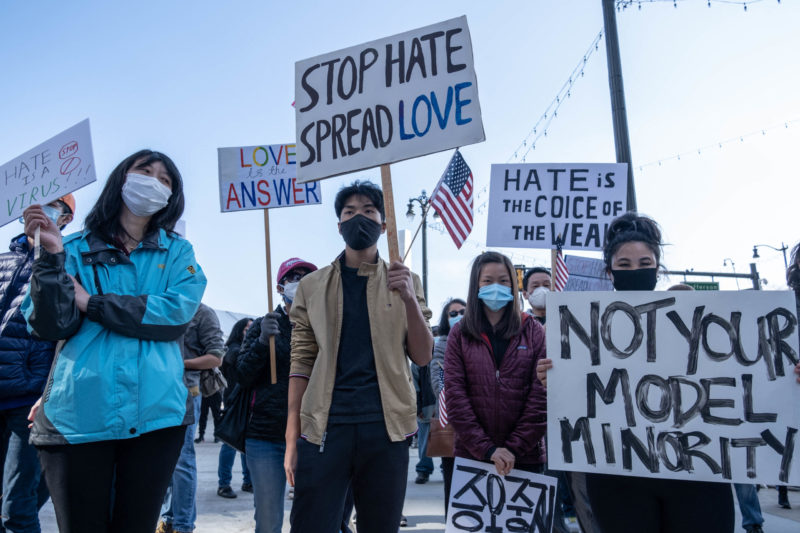What It’s Like Being an Asian American Leader Fighting for AAPI Women
After the Atlanta shootings in March, the National Asian Pacific American Women's Forum felt a "sense of responsibility to hold space and lead."

As the only Asian American organization working at the intersection of racial justice and gender justice, the National Asian Pacific American Women’s Forum was thrust into the spotlight after the Atlanta spa shootings in March. It felt a “really huge sense of responsibility to hold space and lead.”
To view the shootings—in which a 21-year-old man killed eight people, including six women of Asian descent—as a hate crime without also making the connections to gender and sexual violence erases the visibility that NAPAWF has been fighting for since its founding in 1996. The organization was created by 100 Asian American and Pacific Islander women to create social, political, and economic change for AAPI women and girls through a reproductive justice lens.
“Very few other organizations are speaking up and saying, ‘This is a racialized gender-based violence, a racialized sexual violence.’ Everyone is talking about it only as a racial hate crime. That nuance is not always there,” Executive Director Sung Yeon Choimorrow told Rewire News Group about a month after the shootings.
“The core tenet of [reproductive justice] is agency—the right to determine and make meaningful decisions about ourselves, our body, our family. Right now, the reasons why we can’t do that is because we are completely invisible or we are hypervisible in very stereotypical ways that are harmful to our community.”
The following interview has been edited for length and clarity.
Rewire News Group: NAPAWF has been on the frontlines since the shooting, as a resource—for myself, too, as a Korean American—and to process and grieve and find community. I’m wondering what it’s been like for you, leading the organization. Has your strategy changed at all since?
Sung Yeon Choimorrow: I felt like there were very few other Asian American leaders who were putting out that intersectional messaging about why these women were murdered. I’m really proud and glad to say that while our narrative isn’t the dominant one that it didn’t get lost out there, that there was talk about the intersectionality. I feel like people [were able to see it] as a racial crime and sexual violence.
My main message in all of this is: How do we leverage this moment moving forward? Has our strategy changed? No, actually. This is our core bread and butter work. We’re about building power with Asian American women and girls, and what [the shooting] did is propel us into a level of visibility that we could have never dreamed of. We’re really trying to capitalize on the number of people that are coming to know us now and figuring out how we take them meaningfully for the long term: How do we go from just coming together because of grief and pain and turning that into power—which has really been what we do all along.
I know you have a young daughter. How have you approached these kinds of conversations with her at a young age?
SYC: It’s all about helping them understand with their imagination and the language they have. So, in our family, we’re very big on raising my daughter to understand consent. She understands her body is her body, and she gets to decide what she wants to do with her body and what she’s comfortable with.
So it’s not necessarily talking about the murders and what’s happening, specifically, but it is about instilling in her the values and the worldviews and the perspectives for her to be able to deal with these issues in a way that she’s not caught off guard, that she knows what’s OK and what’s not OK from a very young age.
What are one or two things you’ve learned over the last few weeks, and what brings you hope and joy?
SYC: I’m really floored and shocked the number of people who had no idea that Asian American women experienced this very specific type of racialized misogyny. I just didn’t know people didn’t know that. I have had both men and women reporters who are like, “Are you serious? Like that happened to you on the street?” They’re so shocked.
We’re kind of having this reckoning moment around that. It really goes to show how invisible we’ve been in this country. Our organization’s been around for 25 years, and our tagline is “be seen, be heard, and be fierce.” Like, literally, we’ve been trying to be seen and heard for the last 25 years, and now you’re finally listening because there was a mass shooting.
I’m trying to find the silver lining in the grief and the pain I’m bringing to this work—I was actually talking to a couple of my Korean friends about it, we just couldn’t stop crying. And I had this epiphany, like this moment of realization that we are bringing the pain and the grief of our ancestors. My grandmother was sexually assaulted by U.S. military personnel. My other grandmother worked in the camp towns, which revolved around a lot of sex work with military bases in Korea, so everything that happened with the six women just brought up all of that for me. And I think it’s done that for many others, especially Korean or Filipino or other women who have this tie to militarism. I hope that I’m doing right by my ancestors and all the women carrying all this grief and pain.
Being with my daughter, making sure I make time for myself, those kinds of things really help me stay balanced and [find] joy. These moments are not the easiest thing, but I’m trying to stay grounded.
